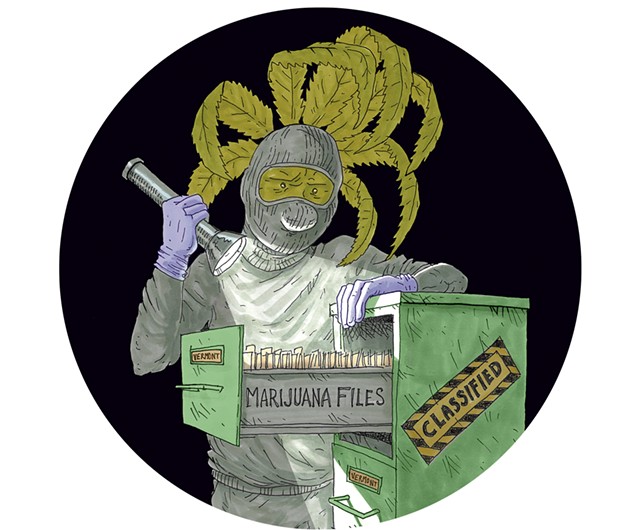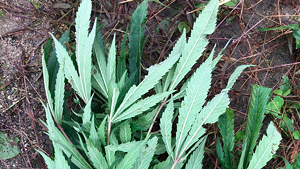
With a few keystrokes, anyone can find a trove of online information about physicians licensed to practice in Vermont: their specialty, where they work, their license status and whether the state has ever disciplined them.
But a cancer patient in search of a reputable Vermont medical marijuana dispensary will find such information much harder to come by. That's because the five dispensaries, which are regulated by a division of the state's Department of Public Safety, can prevent the release to the public of any information about them.
A recent Seven Days public records request for state documents about the dispensaries laid bare the process. It revealed that the medical marijuana providers have faced few consequences for misconduct and can operate in near secrecy, without any public or legislative oversight. In one instance, the state withheld the result of an investigation at the request of a dispensary.
"There are so many questions about how regulation is working in Vermont, and it hasn't been easy to get those answers," said Matt Simon, the New England political director for the Marijuana Policy Project, which lobbies for legalized recreational and medical cannabis. "We want people to have confidence in the program, but I don't know that that can be achieved without some degree of transparency."
To explore the regulatory apparatus, Seven Days filed a records request in June with the Department of Public Safety seeking all complaints made since 2013 involving the dispensaries, as well as documents from any subsequent state investigations. The department informed Seven Days it would take longer than usual to answer the request — and then blamed the dispensaries for an even longer delay. Five weeks later, the department said it had asked and received permission from the dispensaries to release some records.
The documents arrived via email with portions of each one blacked out. They include a list of 64 complaints and five resulting state actions.
The department redacted the names of the complainants, dispensaries, employees and even the dates of the incidents. The redactions obscure basic information, such as which dispensary was involved in which complaint.
"If you're a convenience store and you sell beer to a kid, everybody knows who you are. They don't hide that," said Tom Kearney, a veteran journalist with the Vermont Community Newspaper Group. "What's the problem? Where's the parallel? What's the basis?"
The broad exemption to the state's Public Records Act dates back to 2012, when a small group of lawmakers approved the Rules Governing the Vermont Therapeutic Use of Cannabis Program for the state's soon-to-open medical marijuana dispensaries. The document was written by the Department of Public Safety and unanimously adopted by the Legislative Committee on Administrative Rules.
"Applications, supporting information and other information regarding a registered dispensary are confidential," the regulations read. "Information pertaining to a dispensary, and the principal officer, the board members, or employees of a dispensary are all confidential."
Kearney, then managing editor of the Stowe Reporter and Waterbury Record, and other journalists ran headlong into the rules later that year while seeking basic information about the proposed dispensaries, such as where they would be located. Citing the recently adopted regulations, state officials withheld the information.
Learning about the confidentiality exemption "outraged me," Kearney said.
"How can the rules go beyond the extent of the law that the legislature adopted?" he asked, referring to the state's Public Records Act.
At the time, a specially convened Public Records Legislative Study Committee was reviewing some 250 exemptions from the public records law; open-government advocates said that number was way too high. Among them was Allen Gilbert, then executive director of the American Civil Liberties Union of Vermont. He testified that the medical marijuana dispensary exemption was overbroad.
"To say a whole class of records is exempt simply because of the kind of records they are really is a subversion of the basic constitutional requirement that the public should have access to what are public records," Gilbert said in an interview. "It should only be in more narrow circumstances that a record is not made public."
Kearney said he left the Stowe Reporter and Waterbury Record not long after the inquiry and didn't pursue the matter further. It appears no other open-government advocate made any progress, either: In 2015, the Department of Public Safety revised the rules in a way that only expanded the powers of the dispensaries to review and withhold records. One section explains that all "records maintained and information received by the Department are confidential" except "with the written permission of the ... registered dispensary to disclose their respective record."
The Legislative Committee on Administrative Rules unanimously adopted the changes on October 8, 2015. In other words: The regulated decide what documents their regulator can release.
This summer, the public safety department cited the confidentiality rule when it released the redacted information to Seven Days — and when Commissioner Michael Schirling denied the newspaper's appeal of the withheld sections.
"Please note that you may contact the dispensaries directly to ask if they have copies of the records regarding investigations into their operations and will release these records to you without redactions," Schirling wrote.
Dispensary operators did not seem eager to air their dirty laundry when Seven Days contacted them last week.
Christopher Walsh, the president of Grassroots Vermont, said the state had not investigated a complaint at the Brandon-based dispensary in the 15 months that he'd worked there. If it had, Walsh said, he would make the document public, though he thought the onus was on the state, not the dispensaries, to do so.
"We adhere to their laws; they don't adhere to our laws and rules and regulations," Walsh said. "They set the rules and parameters of this regulated market, not vice versa."
Charlie Rice, chief executive officer of Montpelier-based Vermont Patients Alliance and its partner company, PhytoCare Vermont in Bennington, said he was mindful of patient confidentiality concerns in releasing information. But he said he'd never turned down a public records request during the year he'd been CEO, and he had approved the release of a handful of documents.
"We follow the rules that were established and, obviously, a lot of that was done before I was even involved in the program," Rice said. "So it's hard for me to speculate or comment on the basis for why they were drafted in that manner."
Shayne Lynn, executive director of Champlain Valley Dispensary and Southern Vermont Wellness, was around in 2012 when the rules were created. He attended meetings and argued in favor of keeping certain dispensary information confidential, according to media reports at the time.
In response to requests for comment, Lynn emailed a written statement.
"We continue to follow state laws and operate within the framework that they set," he wrote. "If those laws or rules change, our policies will change to remain compliant and in good standing with the state."
Since they first opened in Vermont, medical marijuana dispensaries have not made many headlines for allegations of wrongdoing. The highest-profile accusation came to light last year, when an unidentified person accused Champlain Valley Dispensary of growing marijuana — not hemp, as the business claimed — at a Craftsbury vegetable farm.
Two complaints among the batch the state released to Seven Days appear to reference the incident.
"[Redacted] immature plants were provided to [redacted] and [redacted]," one reads. "Will be harvested in the next two weeks. Possible location [redacted]. Three months ago."
A follow-up reads: "Harvesting today."
When investigators visited the farm in early October 2018, they discovered that the plants had been recently harvested. A lab test showed that a plant scrap left behind contained high levels of THC, the psychoactive compound in cannabis.
Vermont State Police told Seven Days in June that the department would not investigate the allegations and had instead referred the matter to the Vermont Crime Information Center — the public safety division that directly oversees the medical marijuana program — for regulatory review.
At the time, Lynn declined to release the results of the investigation. And he or someone at his company asked the state to withhold the information in response to Seven Days' records request, which was filed June 6.
But this newspaper obtained an unredacted version of the document. In the one-page notice of noncompliance, VCIC director Jeffrey Wallin wrote that the dispensary had failed "to submit a proposal for hemp operations."
He warned that "future violations" could affect the company's standing with the state, noting also that "no additional actions by CVD are necessary at this time."













Comments (2)
Showing 1-2 of 2
Comments are closed.
From 2014-2020, Seven Days allowed readers to comment on all stories posted on our website. While we've appreciated the suggestions and insights, right now Seven Days is prioritizing our core mission — producing high-quality, responsible local journalism — over moderating online debates between readers.
To criticize, correct or praise our reporting, please send us a letter to the editor or send us a tip. We’ll check it out and report the results.
Online comments may return when we have better tech tools for managing them. Thanks for reading.